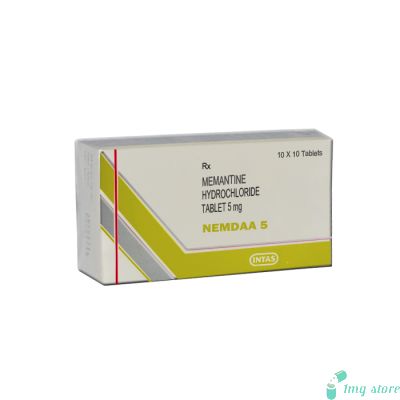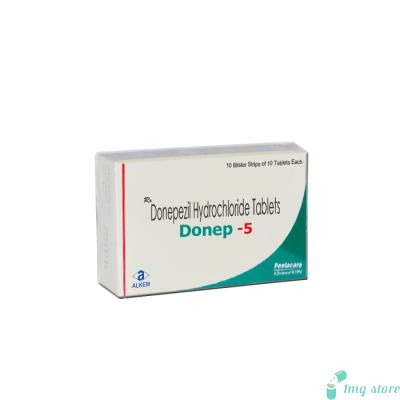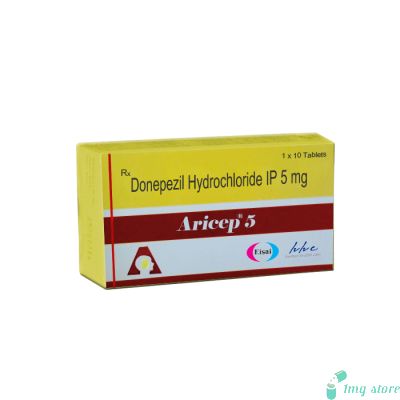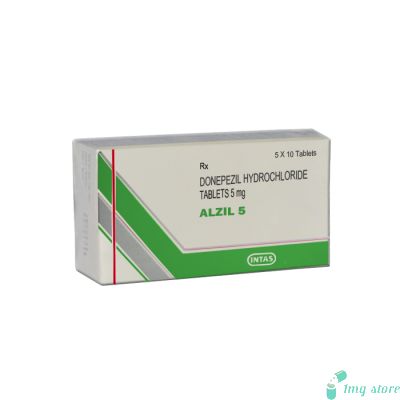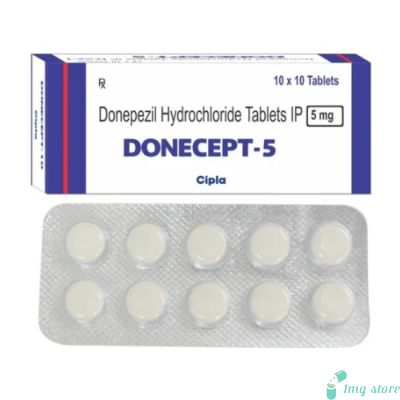Admenta Tablet (Memantine)
Admenta Tablet (Memantine) is a medication used for memory enhancement and cognitive support. Each tablet contains Memantine, which is the active ingredient responsible for its therapeutic effects. It is also known as Namenda.
Admenta Tablet (Memantine) for memory enhancement and cognitive support
Admenta Tablet (Memantine) is a medication used for memory enhancement and cognitive support. Each tablet contains 10mg of Memantine, which is the active ingredient responsible for its therapeutic effects. Admenta Tablet is commonly prescribed to improve memory function in individuals with conditions such as Alzheimer's disease and other forms of dementia. It is also sold under the brand name Namenda. It helps to enhance memory recall and reduce memory loss, thus improving overall cognitive abilities. Admenta Tablet provides mental support by targeting the underlying mechanisms that contribute to cognitive decline. It works by modulating the activity of certain brain chemicals involved in memory and learning processes. This helps to improve attention, concentration, and other cognitive functions.
Memantine 10mg Tablet: Admenta Tablet is available in a dosage strength of 10mg of Memantine. The tablet is taken orally and is usually prescribed as a once-daily dose. It is important to follow the recommended dosage and instructions provided by your healthcare provider. Again 5mg strength is also available but should be taken as directed by your Physical care physician.
Please note that Admenta Tablet should only be taken under the supervision of a qualified healthcare professional. It is essential to consult your doctor before starting any new medication, including Admenta Tablet, to ensure it is appropriate for your specific condition and medical history.
As Memantine Tablet (Admenta) is a Neurology Drug, that offers several benefits in the treatment of various neurological conditions.
Memory enhancement: Memantine helps to improve memory function by regulating the activity of certain brain chemicals involved in memory and learning processes. It can enhance memory recall and reduce memory loss, leading to improved cognitive abilities.
Cognitive support: Memantine provides mental support by targeting the underlying mechanisms that contribute to cognitive decline. It helps to improve attention, concentration, and other cognitive functions, thus enhancing overall cognitive abilities.
Slows disease progression: Memantine has been shown to slow down the progression of Alzheimer's Disease and other forms of dementia. By protecting brain cells from excessive damage and reducing the toxic effects of certain substances in the brain, it helps to preserve cognitive function for a longer duration.
Behavioral improvements: Memantine can help reduce behavioral and psychological symptoms associated with dementia, such as agitation, aggression, and irritability. It may have a calming effect on individuals with dementia, leading to an improved quality of life for both patients and caregivers.
Well-tolerated: Memantine is generally well-tolerated and has a low incidence of side effects. It can be used safely in conjunction with other medications commonly prescribed for dementia, such as cholinesterase inhibitors.
It is important to note that the benefits of Memantine Tablet can vary from person to person, and individual responses to the medication may differ. It is crucial to consult with a healthcare professional who can assess your specific condition and determine the appropriateness of a Memantine Tablet for your situation.
Here are some precautions to consider when taking Memantine Tablet (Admenta):
Medical supervision: Memantine should be taken under the guidance and supervision of a qualified healthcare professional. They will determine the appropriate dosage and monitor your response to the medication.
Allergies: Illuminate your primary care physician about any known sensitivities to Memantine or some other prescriptions. This is essential to stop any possible hypersensitive responses.
Pregnancy and breast-feeding: If you are pregnant, planning to become pregnant, or breastfeeding, it is essential to consult your doctor before taking Memantine Tablet. The potential risks and benefits should be evaluated to ensure the safety of the medication for both you and the baby.
Kidney function: Memantine is primarily excreted through the kidneys. If you have impaired kidney function, your doctor may need to adjust the dosage accordingly to prevent the buildup of the medication in your body.
Liver function: Individuals with liver problems should exercise caution when taking Memantine. Dose adjustments may be necessary in such cases, as the medication is metabolized in the liver.
Driving and operating machinery: Memantine may cause dizziness, drowsiness, or confusion in some individuals. If you experience such side effects, avoid driving or operating machinery until you are sure of your ability to do so safely.
Alcohol consumption: Alcohol may intensify the side effects of Memantine, such as dizziness and drowsiness. It is advisable to limit or avoid alcohol consumption while taking this medication.
Remember, these are general precautions, and it is important to consult with your healthcare professional for personalized advice based on your specific medical condition and history.
Major Utilizations of Namenda Tablet
Memantine Tablet (Admenta) is primarily used for the treatment of Alzheimer's disease and other forms of dementia. It is prescribed to help improve memory, cognitive function, and overall quality of life in individuals with these conditions.
Additionally, Memantine may be used off-label for certain other conditions, although its effectiveness for these indications is still being researched and evaluated. Some potential off-label uses of Memantine include:
Vascular dementia: Memantine may be considered in the treatment of vascular dementia, a type of dementia caused by impaired blood flow to the brain.
Parkinson's disease-related dementia: Memantine may be used in individuals with Parkinson's disease who develop dementia as a secondary complication.
Autism spectrum disorders: Some studies suggest that Memantine may have a beneficial effect in improving certain symptoms associated with autism spectrum disorders, such as social interaction and communication difficulties. However, further research is needed in this area.
Here are some common secondary effects associated with the use of Memantine Tablet (Admenta):
Dizziness: Some individuals may experience dizziness while taking Memantine. It is advisable to avoid activities that require alertness, such as driving or operating machinery, if you experience dizziness.
Headache: Migraines can happen as a result of Memantine. Assuming cerebral pains continue or deteriorate, counsel your medical services proficiently for additional assessment.
Fatigue: Memantine may cause feelings of tiredness or fatigue in some individuals. If you experience excessive fatigue, it is recommended to discuss this with your doctor.
Nausea: Nausea and gastrointestinal discomfort, such as vomiting or stomach pain, can occur as side effects of Memantine. Taking the medication with food may help alleviate these symptoms.
Constipation: Memantine may lead to constipation in some individuals. Increasing fluid intake, incorporating fiber-rich foods into your diet, and staying physically active may help manage this side effect.
Agitation or confusion: In rare cases, Memantine may cause agitation or confusion, particularly in elderly individuals. If you or your loved one experiences significant changes in behavior or confusion, seek medical attention.
Urinary tract infections: There have been reports of an increased risk of urinary tract infections in individuals taking Memantine. Be mindful of any symptoms such as a burning sensation while urinating, frequent urination, or cloudy urine, and consult your healthcare professional if such symptoms arise.
Can I stop taking Memantine suddenly?
No, it is important not to stop taking Memantine abruptly without consulting your healthcare professional. They will guide you on the appropriate tapering schedule to gradually discontinue the medication.
Can Memantine Tablet be crushed or split?
No, it is recommended to swallow Memantine Tablet whole without crushing or splitting it. Breaking or crushing the tablet may affect its controlled-release properties and alter the effectiveness of the medication.
Can Memantine be used in children or adolescents?
Memantine is generally not recommended for use in children or adolescents. Its safety and efficacy in this population have not been well established. Consult your doctor for alternative treatment options.
How long does it take for Memantine to show its effects?
The onset of action of Memantine can vary from person to person. Some individuals may experience improvements in cognitive function within a few weeks, while others may require several months of treatment. It is important to be patient and follow the recommended dosage as prescribed by your healthcare professional.
Are there any specific laboratory tests required while taking Memantine?
Routine laboratory tests are not typically required for individuals taking Memantine. However, your doctor may order certain tests to monitor kidney or liver function if you have pre-existing conditions or are taking other medications that could potentially interact with Memantine.
Can Memantine Tablet be used for conditions other than dementia?
Memantine is primarily prescribed for Alzheimer's disease and other forms of dementia. Its effectiveness for other conditions has not been well established. Do not use Memantine for any other condition without the guidance of your healthcare professional.
Here are some important points regarding drug-drug and food-drug interactions with Memantine Tablets:
Drug-Drug Interactions:
Memantine is often used in combination with cholinesterase inhibitors (such as Donepezil) for the treatment of Alzheimer's disease. Close monitoring is required when these medications are used together.
Simultaneous utilization of Memantine with dextromethorphan, which is tracked down in a few hack and cold drugs, may build the gamble of unfavorable impacts. Counsel your PCP prior to utilizing these prescriptions together.
Memantine may interact with medications having anticholinergic effects, such as certain antidepressants, antipsychotics, and antispasmodics. Combined use can lead to an increased risk of side effects, including confusion and urinary retention. Concurrent use of Memantine with other NMDA receptor antagonists, such as amantadine or ketamine, should be avoided due to an increased risk of side effects.
Food-Drug Interactions:
There are no specific food restrictions associated with Memantine Tablet. It can generally be taken with or without food.
However, certain food items or beverages, like grapefruit juice, may interact with other medications you are taking. It is important to consult your healthcare professional or read the medication label for any specific dietary restrictions.
It is crucial to inform your healthcare provider about all the medications, including prescription, over-the-counter drugs, and dietary supplements, that you are currently taking. They can provide guidance on potential interactions and help adjust the dosage or timing of medications if necessary.
| Manufacturer | : | Sun Pharma, India |
| Equivalent Brand | : | Namenda |
| Generic Search | : | Memantine |









